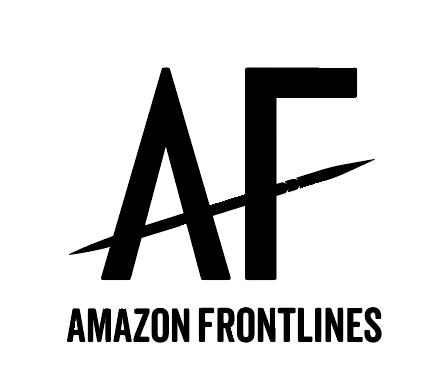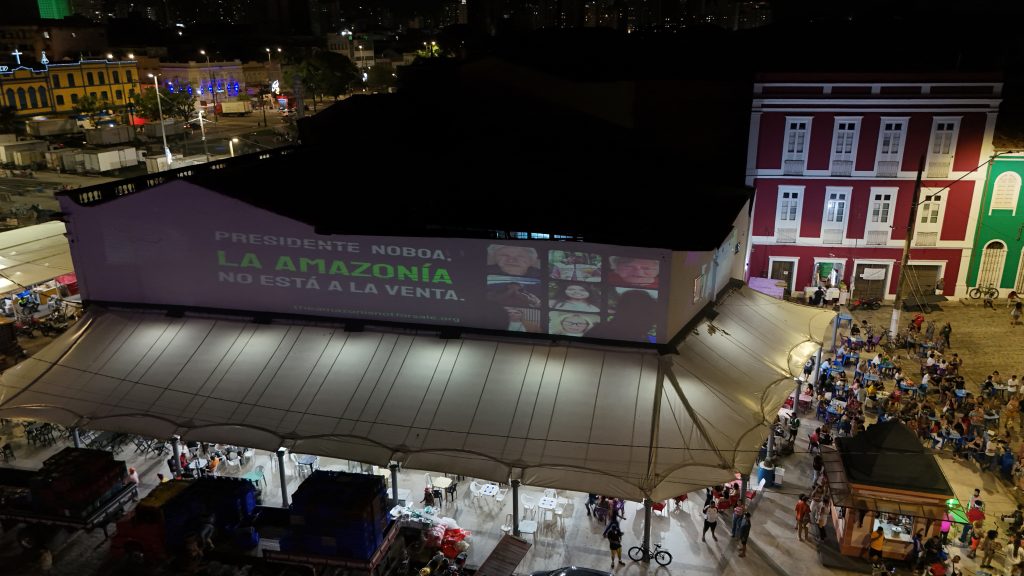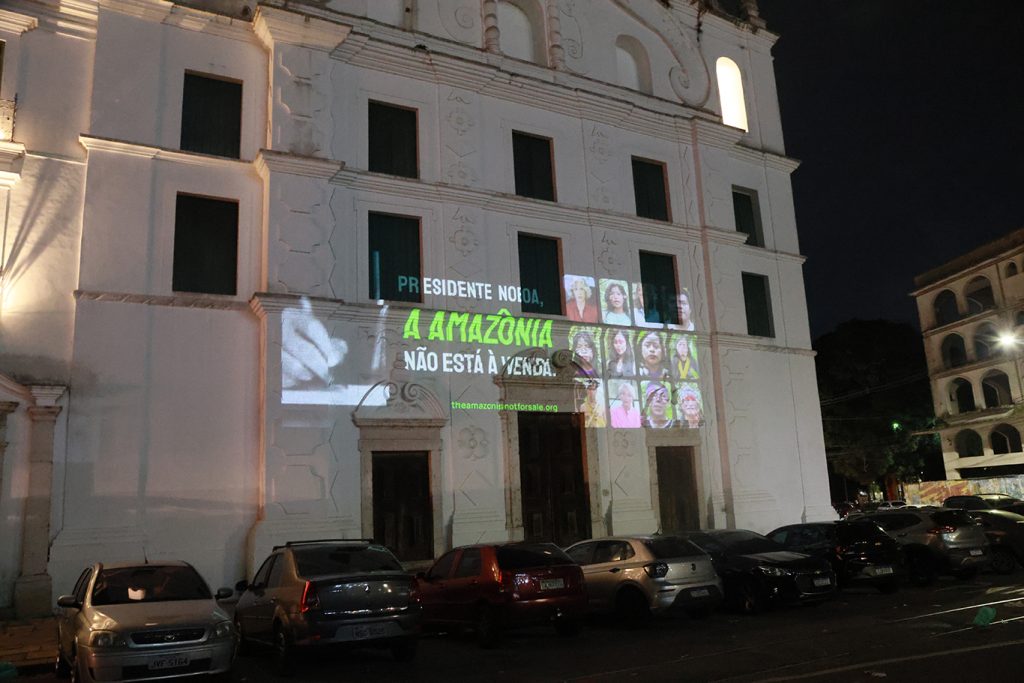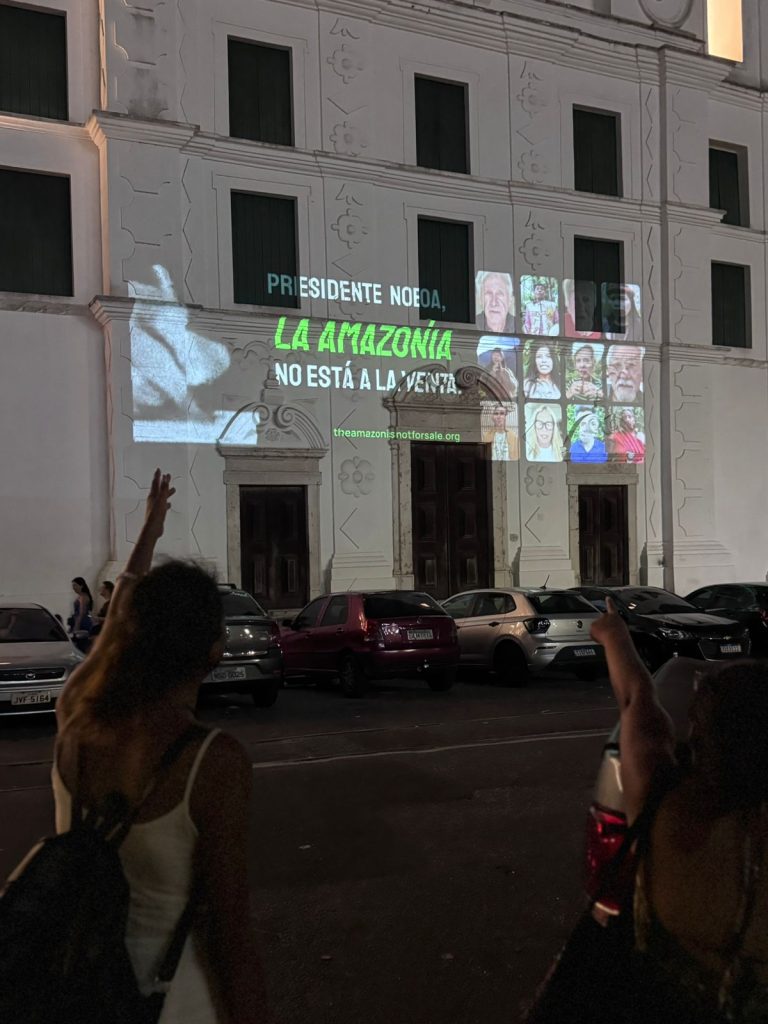
Belém de Pará, Brazil, November 20, 2025.- With a series of nighttime projections on iconic buildings in the city of Belem, host of COP30 on climate change, global celebrities such as Jane Fonda, Harrison Ford, Emma Thompson, Eugenio Derbez, Stephen Fry, Cynthia Nixon, Chelsea Handler, and Lily Tomlin sent a video message to the Ecuadorian government: “Noboa, the Amazon is not for sale.”
The message was projected onto four different buildings in the city of Belem, so that the world could learn about the risk posed by the aggressive oil agenda promoted by the Ecuadorian government, with nearly 50 tenders threatening at least 29,663.42 km² (an area similar to the entire territory of Belgium) of ancestral territories of indigenous peoples and nationalities in the Ecuadorian Amazon, one of the most biodiverse regions in the world.



Photoshop 1: Felipe Spencer / Amazon Frontlines. Photo 2 and 3: Iván Sawyer / Amazon Frontlines
As countries, including Brazil, are finally negotiating the switch to renewable energy, and negotiations are intensifying between countries seeking solutions to climate change, inside the room, Ecuador’s Minister of Environment and Energy, Inés Manzano, is doubling down on fossil fuels, rejecting any transition to clean energy and pushing for drilling in the Amazon.
Minister Manzano affirms that President Noboa’s government is committed to multilateralism, international cooperation, and the building of strategic alliances. Indigenous leaders from the Ecuadorian Amazon have issued a Statement (in Spanish) warning of the risks they face from the promotion of oil and mining exploration and exploitation policies that will directly affect their ancestral territories. They also warn that while the Ecuadorian government offers policies on security and combating crime, it also persecutes those who criticize it and represses social protest; and while it provides social improvements, the cost of living is rising and minimum living conditions are worsening. Therefore, they conclude that the energy, climate, and human rights policies promoted by Noboa are contradictory and regressive with respect to global efforts to address climate change and protect the Amazon’s biodiversity.
In none of these new projects were the seven Indigenous peoples and nationalities affected consulted, as required by the Constitution. The right to free, prior, and informed consultation and consent is established in Ecuador’s Constitution, recognized by the Constitutional Court of Ecuador, as well as in the UN Declaration on the Rights of Indigenous Peoples and ILO Convention 169.
This message also comes five days after the Ecuadorian people said NO in a referendum to create a new Constitution, which would have been regressive in terms of Rights of Nature, human rights, and collective rights of indigenous peoples, and which would have facilitated the implementation of oil and mining projects by dismissing legal restrictions.
The central concern of the indigenous peoples and nationalities stems from the “Hydrocarbon Roadmap” announced by the Ecuadorian government in August 2025. This ambitious and controversial plan includes 49 projects with a projected investment exceeding 47 billion USD, representing a severe threat to vast extensions of the Ecuadorian Amazon. This area contains delicate ecosystems and the ancestral homes of diverse indigenous communities. Crucially, 89% of these threatened territories in the Amazon are intact primary forests, among the best-conserved in the region and collectively acting as a vital climate buffer.
The international community has issued strong calls from multiple fronts to the Ecuadorian government to halt this plan, which threatens the protection of the Amazon and the people who call it home.
Joining this call are 30 international organizations that express profound concern regarding the media campaign in Ecuador to stigmatize and persecute Indigenous Guards. These Guards are ancestral, community-based bodies dedicated to defending life and territory. Yet, they have been compared to terrorist and subversive groups and even accused of acting under the command of organized crime rings. This critical matter has already been presented before the Inter-American Court of Human Rights.
In addition, a group of eleven international experts, including lawyers, biologists, anthropologists, ecologists, and human rights specialists, also united their voices to acknowledge that in Ecuador, Indigenous peoples have won historic cases that protect the Amazon and have inspired actions globally for the defense of the climate and nature.
Note: The campaign “The Amazon Is not For Sale” was launched in New York last September with a social media post made by Fonda and shared by other celebrities during the United Nations General Assembly.
Press contact:
Raúl Estrada
Amazon Frontlines
raul.estrada@amazonfrontlines.org
+52 55 8019 6422




